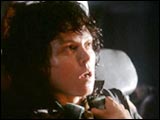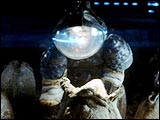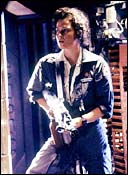
Twenty-four years after he deleted a few minutes from the climax of his landmark chiller
Alien, director Ridley Scott has finally got a chance to atone for his mistake.
The filmmaker introduced a restored and revised version of the movie at the Toronto International Film Festival in September. He said he had trimmed a few scenes from the film to make the flow smoother. The new version has about six minutes of footage that was deleted from the original version.
Though these scenes are available in the DVD version, see the restored film on the big screen this week and scare yourself silly. Discover how the action and suspense that made
Alien such a hit over two decades ago can still shake us up today, never mind how many more horror films we have seen in recent years.
Alien: Director's Cut
, with enhanced sound effects, is being released this week in major North American cities by 20th Century Fox.
Compared to the current crop of scarefest movies, including the remade
The Texas Chainsaw Murders, Scott's film is remarkably gripping and special. It is in the top section of many moviebuffs' list of all-time frighteners. Other top rankers include
Jaws,
Wages Of Fear,
Psycho and
The Exorcist.
Alien was the second film directed by Scott after
The Duellists. He later went on to direct such films as
Thelma & Louise,
Gladiator and
Hannibal.
Scott
said in Toronto that eerie scenes focusing on actors Harry Dean Stanton and Tom Skeritt who 'disappear' have been added to the new version. Look out for the scene in which Ripley (Sigourney Weaver in the role that made her a star) stumbles on captain Dallas (Skeritt) after the alien has dealt with him.

Scott said he had deleted the now-restored scenes because he was afraid the 17-minute climax would be too unwieldy.
The movie was based on a story by Dan O'Bannon, who joined three others including Walter Hill (himself a distinguished director) to write the script.
A ship sent to investigate an SOS distress call encounters an alien that begins to kill the crew members one by one. The movie focused on the interstellar freighter crew being terrorised by this seemingly invincible predator discovered on a derelict space craft. The film -- like Scott's more superior
Blade Runner -- set high sci-fi standards in art design, creature creation and visual effects. It encouraged writers to create more female action heroes.
The second movie in the series,
Aliens, which was directed by James Cameron, made much more money in 1986 than the first one. In all, there were four
Alien movies. The first one, of course, has a special appeal.

The reason
Alien is still remembered today, Scott believes, is because it can still scare the wits out of anyone. It also took the standard B-grade movies and elevated the formula to a classy level by creating a superior-looking beast. Its cast included some of the finest character actors and a formidable heroine.
Film historians also believe Scott created a grittier sci-fi movie with more believable characters than the ones seen in many other movies in the genre.
Alien is also notable for its pacing. The suspense builds very slowly, unlike in many of today's sci-fi films. That was one of the things that went wrong in the case of the recent box office disappointment,
The Hulk. People complained they had to wait too long for the action to explode.
The gradual increase in the tension -- achieved with substantial contribution from composer Jerry Goldsmith -- offers viewers an opportunity to know the movie's character better. They also wonder what the alien really looks like.
Another astounding part of the script is Ripley's character. Unlike her employers, she is not interested in getting the alien back home. She is ruthless in her aim: to kill the beast.
So convincing was Weaver's portrayal of Ripley that she became arguably the first woman who could open a film on her own in a big way.
Click here for More Features
 Twenty-four years after he deleted a few minutes from the climax of his landmark chiller Alien, director Ridley Scott has finally got a chance to atone for his mistake.
Twenty-four years after he deleted a few minutes from the climax of his landmark chiller Alien, director Ridley Scott has finally got a chance to atone for his mistake.  Scott said he had deleted the now-restored scenes because he was afraid the 17-minute climax would be too unwieldy.
Scott said he had deleted the now-restored scenes because he was afraid the 17-minute climax would be too unwieldy.  The reason Alien is still remembered today, Scott believes, is because it can still scare the wits out of anyone. It also took the standard B-grade movies and elevated the formula to a classy level by creating a superior-looking beast. Its cast included some of the finest character actors and a formidable heroine.
The reason Alien is still remembered today, Scott believes, is because it can still scare the wits out of anyone. It also took the standard B-grade movies and elevated the formula to a classy level by creating a superior-looking beast. Its cast included some of the finest character actors and a formidable heroine.